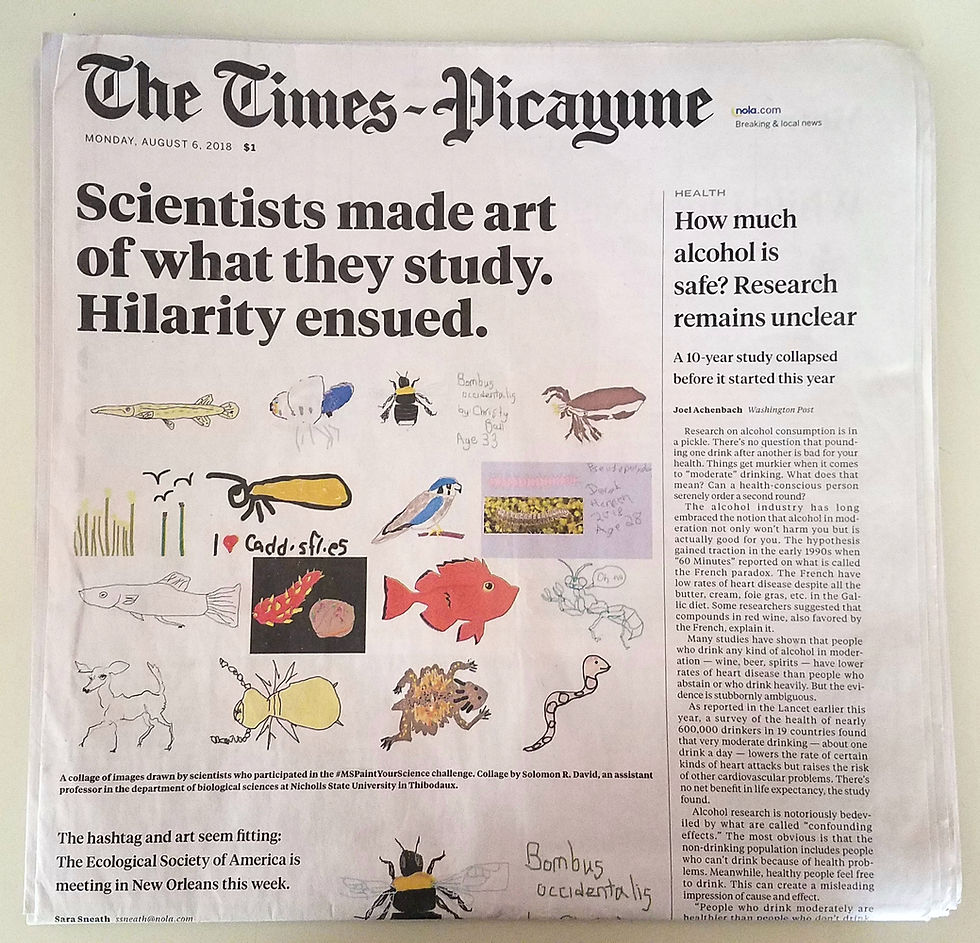Scientists’ SciArt featured by The Times-Picayune (New Orleans, LA)
- Aug 20, 2018
- 3 min read
Updated: May 30, 2024

Journalist Sara Sneath [1] of the New Orleans Times-Picayune recently featured ecologists who sketched their study organisms as part of an impromptu, humorous initiative led by Dr. Solomon R. David* (Nicholls State University). Sneath’s front page story details how ecologists responded to the call to sketch their study organism using the MS Paint program and their nondominant hand.
My take – that doing #sciart is a valuable skill and that skill set can be developed with practice – was included in both the online and print versions of the article.
I noticed that David’s tweets about his sketch of a gar, which initiated the challenge, were apologetic about the artistic quality of his sketch.
Further, I think it’s inspired a new series of MS Paint-poorly-drawn fishes as writing breaks👍 — Dr. Solomon David (@SolomonRDavid) July 31, 2018
I was delighted with the sketch, and I chimed in about not passing judgment. I’m a vocal advocate [2] for people drawing in science, and I think concern over skill level and negative social conditioning are major obstacles that we can overcome through training, practice, and affirmation.
Thanks Bethann! I did indeed make sure it was anatomically accurate and “to scale” (🥁); tried to at least recreate details often missed. Now, a steady mouse-hand would certainly help! — Dr. Solomon David (@SolomonRDavid) July 31, 2018
Welp, then it's not poorly drawn! 🙂 If not aiming for photorealism, then not the standard against which to evaluate the image. +, there's GREAT analysis of relatability/universality of cartoon/simplified drawings (vs photo-real) in @scottmccloud's "Understanding Comics." — CommNatural, MFA (@commnatural) July 31, 2018
I was delighted that the point was taken. Encouragement of the drawings, and a focus on key attributes vs artistic skills, became more common as the #MSPaintYourScience fun progressed.
I know right? These illustrations convey some key characteristics reGARdless of the challenges. Nice work all! #MSPaintYourScience — Dr. Solomon David (@SolomonRDavid) August 1, 2018
I’m sure it’s not as bad as you think! @commnatural had some great comments on conveying the key features in illustration, it’s been impressive what stands out across these crazy #MSPaintYourScience drawings! — Dr. Solomon David (@SolomonRDavid) August 1, 2018
The Times-Picayune‘s online and print versions of the article on the challenge quoted my advice on this point.
A key take-away was that folks found the process of sketching their science in this way helped distill their message or identifying characteristics to bare essentials. This even led to calls for #MSPaintYourScience to be a constraint for abstracts and posters at science conferences.
Can we all just agree that abstract submissions for conferences should now come with #MSPaintYourScience depictions of the talk? — Sarah McAnulty (@SarahMackAttack) August 2, 2018
It really does make one emphasize the key concept points…and/or gives your mind a brief break from writing the actual talk! #MSPaintYourScience🎨🔬👍 — Dr. Solomon David (@SolomonRDavid) August 2, 2018
Note: these suggestions might also have been inspired by the fact that the Ecological Society of America’s annual conference was scheduled soon after in New Orleans. In fact, The Times-Picayune print edition featuring #MSPaintYourScience on the home page came out while ESA was holding it’s annual meeting in New Orleans.
You guys. #MSPaintYourScience #ESA2018 pic.twitter.com/TLhxOoiZrA — Dr. Anna Groves (@annamgroves) August 6, 2018
Check out the #MSPaintYourScience and #SketchYourScience hashtags for lots of fascinating, colorful, inspiring, and entertaining visual science communication. Then, contribute your own!
NOTES
[1] I met journalist Sara Sneath and professor Solomon David in March, at the OceanDOTComm science communication unconference hosted by the Louisiana Universities Marine Consortium (LUMCON). At that conference, I led a ‘Sketching for Scientists’ workshop that both Sneath and David participated in. See out-takes from that workshop, in this blog article I wrote about imposter syndrome, #ScientistsWhoSelfie and sciart.
[2] See the aforementioned blog article, as well as the following for more of my commentary about the importance of a) drawing even if you’re new to it, and b) supporting others’ efforts at sketching.
This is the end of this post. If you see a prompt to subscribe, you're welcome to do so! Your paid subscription helps me allocate time to the resources I share here.



Comments